Search Results
Search
Filter results
Advanced Filters
Your search returned 883 Solutions
-
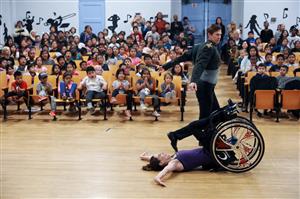
A professional dance company educating youth about disability inclusion in mainstream schools
Infinite Flow, U.S.: A Los Angeles-based inclusive dance company employing dancers with and without disabilities. Focuses on performance and education. Reached some 10,000 youth and 25 mainstream schools by 2023.
Elementary School Assemblies and ‘Scoops of Inclusion’, United States of America -
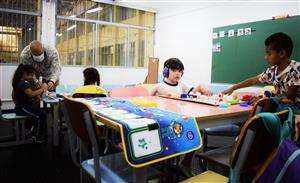
Comprehensive after-school programme supporting children with intellectual disabilities to attend mainstream classes
Instituto Jô Clemente's SEAC Project, Brazil: Enhances regular education access for children with disabilities. Assisted over 320 children and teenagers with disabilities in 2022, providing resources and training for teachers and families.
Specialized Educational Assistance Centre (SEAC), Brazil -
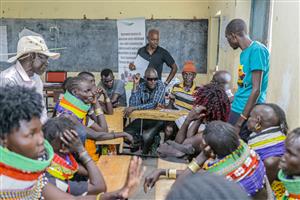
Ensure inclusive early childhood care and education in refugee camps and emergencies
CBM and Waldorf Kakuma Project, Kenya: Runs an inclusive education project in Turkana County for children with disabilities. Provides learning materials and teacher training. From 2021 to 2023, supported close to 2,000 children.
CBM Turkana Inclusive Education Project, Kenya -
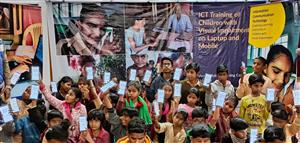
A concerted effort for the usage of accessible ICT devices supporting children with disabilities in low-income contexts
Sightsavers India, a national NGO, promotes inclusive education with accessible ICT devices in remote areas. In 2022, it supported over 6,000 visually impaired learners across mainstream primary and secondary schools.
Eight-State Inclusive Education Programme, India -
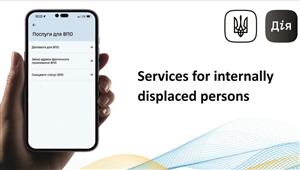
A government e-system making social assistance to persons with disabilities available by smartphone
Unified Information System of the Social Sphere (UISSS), Ukraine: Simplifies access to social support for disadvantaged groups. Allows remote registration and service arrangement, benefiting persons with disabilities with reduced bureaucracy.
Unified Information System of the Social Sphere (UISSS), Ukraine -
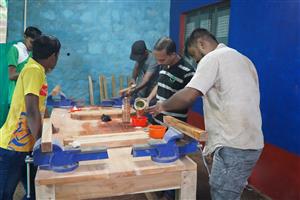
Mainstreaming a self-employment programme for persons with disabilities with Indian-wide government-led institutes
EnAble India's Entrepreneurship Development Programme: Teaches skills to persons with disabilities for self-employment. From 2013 to 2023, trained over 9,000 persons, with 80% becoming self-employed across 562 RSETIs in India.
Entrepreneurship Development Programme (EDP), India -
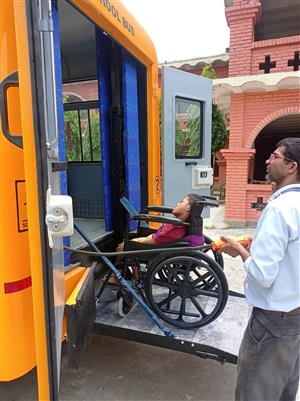
A provincial government creating large-scale enrolment of pupils with disabilities in cooperation with a foundation
Disability Prevention and Rehabilitation Programme, Nepal: A partnership between Koshi Province and Karuna Foundation Nepal since 2008. Constructed 35 accessible schools, enrolling 1,267 children with disabilities. By 2023, expanded DPRP model throughout Koshi Province, with Nepal's government piloting it in other provinces.
Disability Prevention and Rehabilitation Programme (DPRP), Nepal -
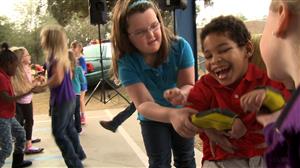
Analysing the whole policy framework to identify barriers towards inclusion
SWIFT provides a package of tools to support schools in analysing policies that are relevant to transform them towards Inclusive Education. The process looks at state statutes, funding principles, professional development and much more. The goals is to improve the academic and behavioural outcomes of all children.
TASH - Disability Advocacy, United States of America -
Supporting school enrolment of girls with disabilities
STEP identified 220 girls with disabilities for school enrolment and provided 180 of them with assistive devices. The project was implemented with the support of parent-teacher councils and school representatives in two districts. STEP also trained 90 teachers in methods for teaching children with disabilities.
STEP - Special Talent Exchange Program, Girl Enrollment Programme, Pakistan -
Inclusive Education for Cambodian children who are blind or deaf
The project offers extra classes for children with visual or hearing impairments to enable them to attend mainstream schools. During the extra lessons students are prepared to follow regular classes by making use of special learning materials in Braille and sign language. The project also created the Khmer Braille and Khmer Sign Language.
Krousar Thmey Foundation, Cambodia
- Page 1
- Page 2
- Page 3
- Page 4
- Page 5
- Page 6
- Page 7
- Page 8
- Page 9
- Page 10
- Page 11
- Page 12
- Page 13
- Page 14
- Page 15
- Page 16
- Page 17
- Page 18
- Page 19
- Page 20
- Page 21
- Page 22
- Page 23
- Page 24
- Page 25
- Page 26
- Page 27
- Page 28
- Page 29
- Page 30
- Page 31
- Page 32
- Page 33
- Page 34
- Page 35
- Page 36
- Page 37
- Page 38
- Page 39
- Page 40
- Page 41
- Page 42
- Page 43
- Page 44
- Page 45
- Page 46
- Page 47
- Page 48
- Page 49
- Page 50
- Page 51
- Page 52
- Page 53
- Page 54
- Page 55
- Page 56
- Page 57
- Page 58
- Page 59
- Page 60
- Page 61
- Page 62
- Page 63
- Page 64
- Page 65
- Page 66
- Page 67
- Page 68
- Page 69
- Page 70
- Page 71
- Page 72
- Page 73
- Page 74
- Page 75
- Page 76
- Page 77
- Page 78
- Page 79
- Page 80
- Page 81
- Page 82
- Page 83
- Page 84
- Page 85
- Page 86
- Page 87
- Page 88
- Page 89